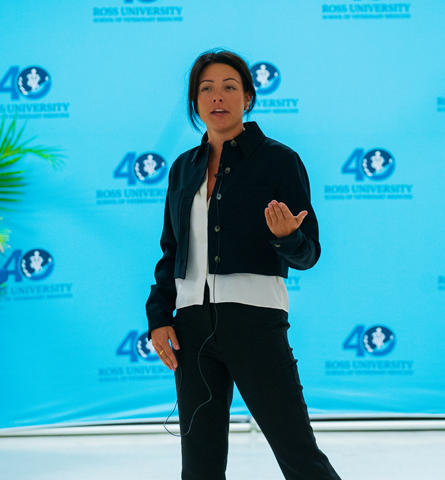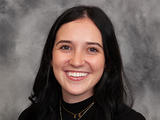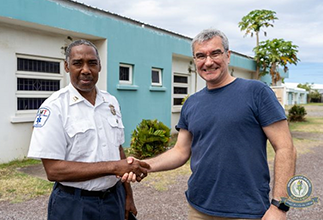This month, Ross University School of Veterinary Medicine (Ross Vet) welcomes the 40th Scientific Meeting of the Association of Marine Laboratories of the Caribbean (AMLC) to St. Kitts. The five-day event, hosted partly on Ross Vet’s campus, over May 22-26, 2023, will foster discussions among global professionals focused on critical topics like the current outbreak of coral diseases, coral restoration efforts, sargassum bloom, use of remote sensing and other techniques for coastal and marine science, sustainable coastal development and conservation, and more.
The 40th Scientific Meeting is an opportunity to connect students, established scientists, policy makers, practitioners, and others with an interest in marine science. Key leaders from organizations such as the National Oceanic and Atmospheric Administration, United States Geological Survey, Florida Fish and Wildlife Institute, Coral Reef Alliance, The Ocean Foundation, Mote Marine Laboratory and more will be in attendance.
“We are delighted that Ross Vet is hosting this event and we can showcase our university and the beautiful Federation of St. Kitts and Nevis,” said Sean Callanan, MVB, CertVR, PhD, FRCPath, DipIECVP, FRCVS, dean of Ross Vet. “The program is strong and topical, and the attendees and AMLC delegates have rich experiences to lend to this program and advance knowledge in marine research.”
THE AMLC AND ROSS VET COME TOGETHER
Ross Vet is one of the 38 institutional members of the AMLC, a confederation of marine research, education, and resource management institutions endeavoring to encourage the production and exchange of research and resource management information, advance the cause of marine and environmental education in the region, and facilitate cooperation and mutual assistance among its membership.
By bringing together participants from a broad collection of geographic and scientific specialties, the AMLC provides a platform for new marine science ideas, discoveries, and techniques and serves to expand regional and interdisciplinary collaborations throughout the Caribbean region. The bi-annual conference has seen a rapidly growing attendance over the last few years as the only Caribbean-focused meeting of its kind.
Mark Freeman, BSc, PhD, professor of aquaculture and aquatic parasitology at Ross Vet, currently serves as president of the AMLC board.
“There is a lot of enthusiasm at Ross Vet for the marine environment because of our location in St. Kitts,” he shared. “The scientific meeting is quite timely as Aquatics is being inserted into the DVM curriculum this Fall, so the timing to host this all sort of fits together and the students are excited about it.”
Ross Vet students can attend the scientific meeting as volunteers or register as an attendee to participate in session topics throughout the week. Members of the World Aquatic Veterinary Medical Association student chapter have taken additional opportunities to volunteer with the conference planning.
Dr. Freeman will also be among several Ross Vet faculty - Anna Becker, DVM, MSc, PhD, associate professor of microbiology; Nicole Atherley, PhD, BSc, postdoctoral fellow; W. Brady Little, DVM MSc, assistant professor of veterinary gross anatomy; Maria Jose Navarrete Talloni, DVM, MPVM, PhD, assistant professor of anatomic pathology - to present their ongoing research during the week.
ONE HEALTH: CONNECTING COASTAL AND MARINE ECOSYSTEMS THROUGH SCIENCE AND PEOPLE
As host institution, Ross Vet has provided overall management of the meeting, arranging facilities for research presentations, receptions, and participant accommodations. Drs. Freeman, Becker, and Atherley took charge of the meeting’s organization guided by the AMLC’s theme - Connecting Coastal and Marine Ecosystems Through Science and People.
“Now more than ever we realize that we're all connected, especially from our perspective as an institution that believes in One Health,” said Dr. Becker. “It’s important to consider that we all live in these ecosystems and our location in St. Kitts allows us to see that interconnection between coastal and marine ecosystems.”
Per the meeting’s scientific program, the theme and subsequent topics encourage presentations on interdisciplinary, integrated science that examine interactions among biological, chemical, physical, and socioeconomic aspects of coastal and marine environments. In Dr. Freeman’s introductory letter enclosed in the Meeting Guide, he notes there was a near record number of oral and poster presentation abstracts submitted in the scientific meeting’s first gathering post-pandemic.
Dr. Becker added: “We wanted to encourage in this program more than ever the role of citizen engagement and science. That interdisciplinary, integrated science approach defines the AMLC. We as veterinarians get the opportunity to mingle with biologists, oceanographers, legislators, policy makers from marine research institutes, from the Caribbean, United States, and South America. It broadens your perspective as a veterinarian and scientist to get that input.”
Learn more about the AMLC 40th Scientific Meeting here.
Learn more about how you can be involved in ongoing research at Ross Vet here.







